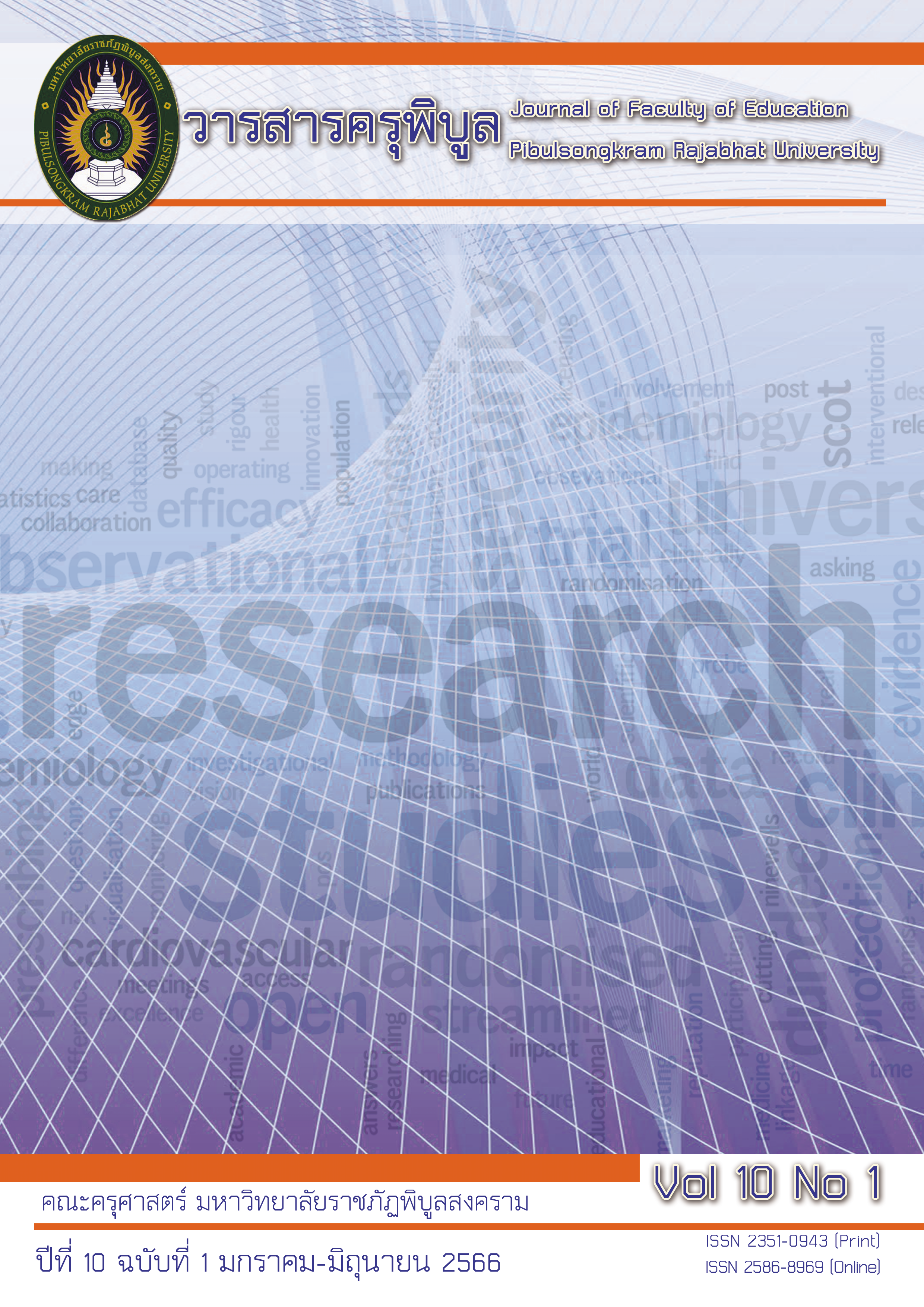THE IMPLEMENTATION OF TIKTOK TO PROMOTE ENGLISH LISTENING AND SPEAKING FOR EFL LEARNERS
Keywords:
TikTok, English listening and speaking, EFL learnersAbstract
This research aimed 1) to investigate the efficiency and effectiveness of TikTok video lessons to improve students’ English listening and speaking skills and 2) to explore students’ opinions on the implementation of TikTok in the learning process. The sample was randomly divided into two groups, one control group and one experimental group. Each group consisted of 21 non-English major students. They enrolled in the English for Work course (ENG1603) in the second semester of the academic year 2022. The control group was given a traditional method while the experimental group was implemented by using TikTok application as a supplementary teaching material. The research instruments included TikTok video lessons, an English speaking and listening test, a questionnaire, and interview questions. The quantitative data were statistically analyzed for t-test, mean, standard deviation, and percentage, whereas the qualitative data from the interview was analyzed based on content analysis.
The findings showed as follows.
1. The efficiency of TikTok video lessons to improve students’ English listening and speaking skills was 81.11/85.00, which was higher than the 80/80 efficiency criteria. Furthermore, the post-test mean of the experimental group was significantly higher than that of the control group. It could be summarized that using TikTok as a supplementary tool in teaching English could significantly promote the EFL learners’ English listening and speaking performance.
2. The level of the students’ opinions on the use of TikTok in the learning process was at the highest level. The majority of the students responded positively to the use of TikTok as a supplementary material in the English listening and speaking lesson
References
Aburizaizah, S. J., & Albaiz, T. A. (2021). Review of the Use and Impact of Nano-Learning in
Education. Proceedings of the 4th International Conference on Education 2021, 83-93.
Adnan, N. I., Ramli, S., Ismail, I. N. (2021). Investigating the usefulness of TikTok as an
educational tool. International Journal of Practices in Teaching and Learning (IJPTL), 1(2). 1-5. Retrieved January 20, 2022, from https://ir.uitm.edu.my/id/eprint/52140
Anumanthan, S., & Hashim, H. (2022). Improving the learning of regular verbs through TikTok
among primary school ESL pupils. Creative Education, 13, 896-912.
Awang, H., Khalid, M. A. S. M., Yin, A. W., & Ya’acob, C. H. (2022). The use of TikTok to
enhance student participation in computer applications class. Journal of Contemporary Social Science and Education Studies, 2(2), 30-40.
Blaschke, L. M. (2014). Using social media to engage and develop the online learner in self-determined learning. Research in Learning Technology, 22(2), 1-15
Cagas, R. L. D. (2022). The Use of TikTok Videos in enhancing the speaking and grammar skills of higher education students. Language Education Forum, 3(1), 1-3.
Dellatto, M. (2021, September 27). TikTok hits 1 billion monthly active users. Forbes. Retrieved from https://www.forbes.com/sites/marisadellatto/2021/09/27/tiktok-hits-1-billion-monthly-active-users/?sh=2167a3ff44b6
EF Education First. (2022). EF English Proficiency Index. Retrieved May 27, 2022, from https://www.ef.com/wwen/epi/
Erwani, I., Romi, M. J., Sawithy, M. N., Rohana, R., Ulfah, S., & Supeni, I. (2022). The influence of TikTok in increasing Vocabulary for elementary school in SMP 1 Muhammadiyah Banjarbaru. ELITE JOURNAL, 4(1), 25-40.
Hsin, W. J., & Cigas, J. (2013). Short videos improve student learning in online education. Journal of Computing Sciences in Colleges, 28(5), 253-259.
Liqian, H. (2018). Study on the perceived popularity of TikTok (master’s thesis). Bangkok: Bangkok University.
Madan, N. (2021). Nano Learning - The futuristic approach to education. International Journal of Innovative Research in Technology, 8(5), 116-120.
Matsakis, L. (2019). How to use TikTok: tips for new users. Retrieved January 15, 2022, from https://www.wired.com/story/how-to-use-tik-tok/
Mukhtar, S. Z. (2019). Using social media in English teaching and learning process. Retrieved June 16, 2022, from https://doi.org/10.31219/osf.io/bnfph
Pratiwi, A. E., Ufairah, N. N., & Sopiah, R. S. (2021). Utilizing TikTok application as media for learning English Pronunciation. Proceedings of the International Conference on Education of Suryakancana 2021. Retrieved February 12, 2022, from https://jurnal.unsur.ac.id/cp/article/view/1374
Szpunar, K. K., Khan, N. Y., & Schacter, D. L. (2013). Interpolated memory tests reduce mind wandering and improve learning of online lectures. Proceedings of the National Academy of Sciences, 110(16), 6313-6317.
Tan, K. H., Rajendran, A., Muslim, N., Alias, J., Yusof, N.A. (2022). The Potential of TikTok’s Key Features as a Pedagogical Strategy for ESL Classrooms. Sustainability 2022, 14, 16876.
Van Pham, A. T. (2022). An investigation into the use of social media in teaching English. ICMET '22: Proceedings of the 4th International Conference on Modern Educational Technology. 44–50. Retrieved May 28, 2022, from https://doi.org/10.1145/ 3543407.3543415
Xiuwen, Z., & Razali, A. B. (2021) An overview of the utilization of TikTok to improve oral English communication competence among EFL undergraduate students. Universal Journal of Educational Research, 9(7), 1439-1451. Retrieved May 28, 2022, from https://doi.org/ 10.13189/ujer.2021.090710
Zhang, T. (2020). A brief study on short video platform and education. Advances in Social Science, Education and Humanities Research, Proceedings of the 2nd International Conference on Literature, Art and Human Development (ICLAHD 2020), 543-547.
Downloads
Published
Issue
Section
License
Copyright (c) 2023 คณะครุศาสตร์ มหาวิทยาลัยราชภัฏพิบูลสงคราม

This work is licensed under a Creative Commons Attribution-NonCommercial-NoDerivatives 4.0 International License.
ลิขสิทธิ์เป็นของคณะครุศาสตร์ มหาวิทยาลัยราชภัฏพิบูลสงคราม


